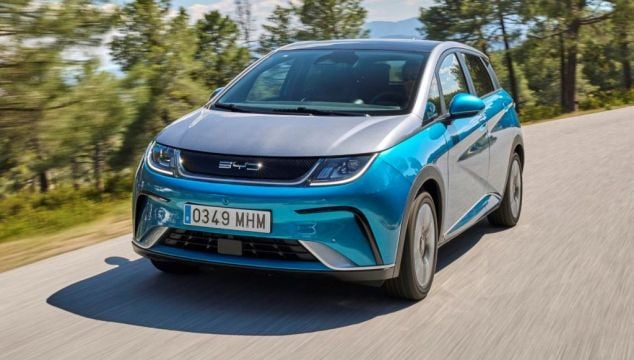The general grumbling about the price of electric cars may be coming to an end.Right now, mention of any new electric vehicle on any of the social media channels generally prompts an avalanche of replies along the lines of ‘I’ll keep my old diesel till the prices come down…’
These posts are usually from someone who’s just spent €35,000 or more on a new diesel SUV, but anyway…
While it’s true that electric cars have, hitherto, been generally much more expensive than their petrol or diesel counterparts, that is changing fast and unsurprisingly, it’s the Chinese brands that are in the forefront of lowering prices.
This week, BYD, which is imported into Ireland by Motor Distributors Limited, announced that its new Dolphin electric hatchback will have a starting price of €25,570. That will get you a basic ‘Active’ model, which comes with a 44.9kWh battery and a one-charge range of up to 340km.
You can’t quite buy that Dolphin model just yet — the first Active-spec versions won’t arrive until early in the new year, but you can order the pricier Comfort model which costs — brace yourself — €29,318. And which comes with a 60.4kWh battery and a 420km range into the bargain.
By comparison, most of the big European brands are only starting to talk about EVs with €25,000 price tags for launch much later in 2024. At the head of this queue is the Citroen e-C3, which is significantly smaller than the BYD Dolphin, and which comes up 20km shorter in range terms. It also won’t be on sale until the last few days of 2024. Its closely-related cousin, the Fiat Panda EV, should also make an appearance next year.
BYD isn’t just undercutting European rivals, though. There seems to be something of a price war going on amid the Chinese car makers right now. MG, for example, has temporarily cut the price of its entry-level MG4 hatchback — similar in size and layout to the BYD Dolphin, with a range of 350km in basic form — to €28,995 (down from €30,995) to try and keep up with its massive Chinese competitor.
Likewise, the Ora Funky Cat, shortly to be renamed the GWM Ora 03, has seen its price cut in recent months to €29,995 in basic form, although it can only offer a 310km range at that price.
BYD currently has five dealers in Ireland — two in Dublin, and one each in Cork, Wexford, and Waterford — and is in negotiations with for more, for Limerick, Galway, Sligo, and Louth. Next up will be its sleek Seal saloon, which with a base price of €40,567 undercuts even the Tesla Model 3 (which has seen its priced dramatically slashed through 2023) and offers more range as standard.
Can the more traditional carmakers keep up with this sort of price-cutting? After all, if you look a the size and space of the BYD Dolphin, most of its direct rivals have prices above €40,000.
There is one that’s almost as affordable, though, and it’s a very familiar one. Nissan has trimmed €5,000 from the price of the Leaf hatchback, giving it a €28,495.
That’s a good price considering the Leaf’s known brand name, and its spaciousness, but it comes up short on range — the 40kWh battery that you’ll get for that price only offers a maximum 270km range on the WLTP cycle. It will be enough for some, but it won’t give the extra flexibility that the Chinese brands are offering.
Nonetheless, Nissan Ireland says that the price cut shows it’s prepared to hit back hard against the newer competition. “The Nissan Leaf is well established as one of Ireland’s best-selling EVs because it offers a range of 270 kilometres on a single charge. It is a well spec-ed car with a good-sized boot and spacious interior to meet the needs of any family or business” said Neil O’Sullivan, Nissan Ireland’s sales director. “We are EV experts and the Nissan Leaf price drop and zero per cent finance deal offers real value as well as an opportunity to go green and to become more sustainable.”
Does the Nissan price cut preview across-the-board reductions from other manufacturers? Sadly it seems not.
Ford, for example, earlier this year chopped between $1,000 and $4,000 from the price of the all-electric Mustang Mach-E in the US market, partly in response to Tesla’s price cuts.
Those price cuts didn’t make it through to the Irish market, with a Ford spokesperson said: “This announcement is specific to North America. Across Europe, we are constantly reviewing our price structure to offer the best possible price for our customers.”
The base price of the Mustang Mach-E in Ireland remains high, at €67,666 — significantly more expensive than rivals from Tesla and Audi.
However, the omens for the future are better. Renault has just announced a new stage of its transformation programme, slightly gratingly called the Renault-lution.
That programme has, in fairness, helped the French car making giant turn around from an €8-billion loss in 2020 to what it claimed as record profitability in the first half of 2023.
In 2024, Renault will launch one of its most significant new cars of the decade — an all-electric replacement for the Zoe hatchback that riffs on the styling of the 1980s Renault 5 hatch, and which revives that car’s name — the Renault 5 EV. Thanks to a comprehensive re-design of the chassis and battery, Renault already reckons that the 5 EV is about 30 per cent less expensive to make than the Zoe, which should be reflected, to an extent, in its price tag.
The company is going further, aiming for a 50 per cent cut in the cost of building an electric car by 2027 as part of its ‘Re-Industry’ programme. Some of that will be trimmed from battery costs, while other savings are already starting to come by using ‘Digital Twins’ of factories, predicting when maintenance and down-time will be needed, rather than reacting to problems.
“Re-Industry is a 360-degree transformation plan,” Thierry Charvet, chief industry officer at Renault said. “The aim is to build on our strengths and to gather speed in what we already do well, to reinvent our entire industrial base and attain the highest standards in excellence. This industrial transformation will make our base more agile, more virtuous and more competitive, while also enabling us to respond more quickly to customer expectations. In this way, for example,
Renault is targeting a production time of nine hours for the future Renault 5.”







